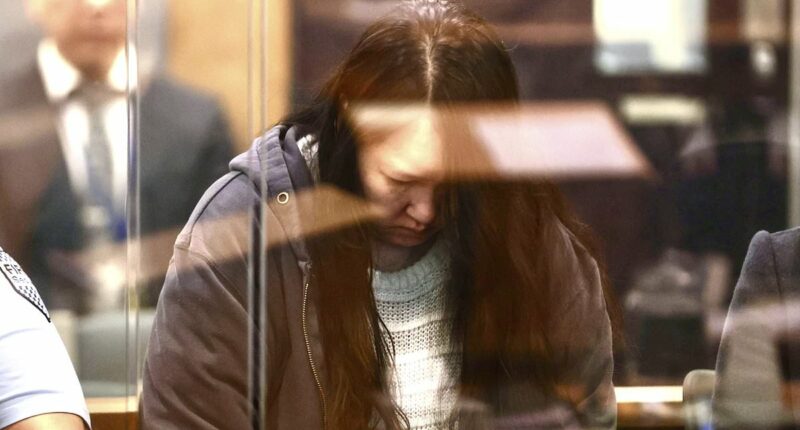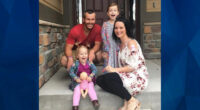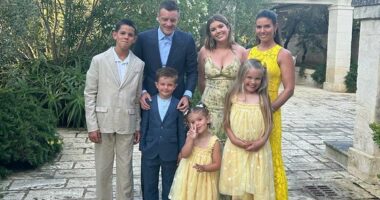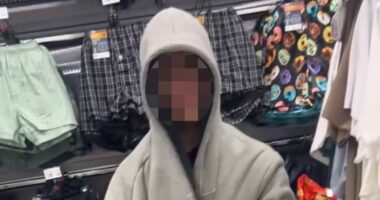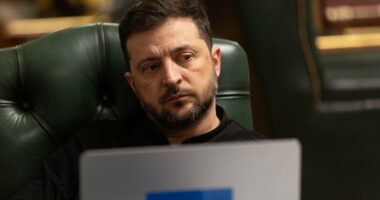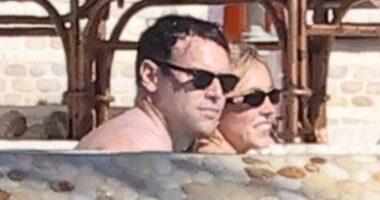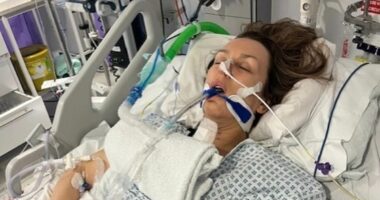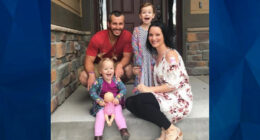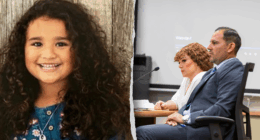Share this @internewscast.com
A New Zealand woman has been sentenced to life in prison for the tragic murder of her two children, whose remains were shockingly discovered inside suitcases left in a storage unit for four long years.
Hakyung Lee, age 43, appeared before the High Court in Auckland on Wednesday, where she received her life sentence. This comes after a jury found her guilty in September of the heinous crime of murdering her young children.
The grim sentencing marks over seven years since the children lost their lives and nearly three years since their bodies were unearthed, shedding light on the harrowing incident that shook the community.
In a chilling act in June 2018, Lee administered a fatal overdose of prescription medication to her daughter, Yuna Jo, aged eight, and her son, Minu Jo, aged six.
She then concealed their lifeless bodies in two suitcases, which she subsequently left at a storage facility in Auckland, abandoning them to the shadows.
It wasn’t until August 2022 that the children’s remains were finally uncovered inside the luggage at the neglected storage unit, bringing a devastating chapter in this tragic story to a close.
Lee, who is a New Zealand citizen, travelled to South Korea and changed her name in 2018, shortly after the children are believed to have been killed.
Justice Geoffrey Venning sentenced Lee to life imprisonment on Wednesday, which will begin as a special patient under the Mental Health Act.

Hakyung Lee (pictured in the High Court in Auckland in September 2025) has been sentenced to life imprisonment

Lee was found guilty in September of killing her children in 2018 (pictured) and putting their bodies in suitcases which were left inside a storage unit for four years
Lee, who kept her head down during the hearing, her long hair covering her face, must serve a minimum of 17 years in jail before she is eligible for parole.
Justice Venning said that while Lee suffered from severe depression, the murders were ‘deliberate and calculated’, and she understood the moral wrongfulness of her actions.
He rejected Lee’s claim that she acted impulsively, and said her organised actions, including changing her name, buying a suitcase, tidying up affairs and sitting a driver’s test, as clear evidence of planning.
Lee’s mother and brother-in-law gave victim impact statements during the sentencing hearing, New Zealand website Stuff reports.
Grieving grandmother Choon Ja Lee said she had been labelled ‘mother of a murderer’ by members of her church.
She added that she ‘deeply regretted’ not taking her daughter to a counsellor after returning from a trip to Australia in 2017.
‘If I had taken her at that time this tragedy might have been prevented,’ Choon Ja Lee said.

The bodies of the children were discovered after Lee stopped paying rental fees for the Auckland storage unit

Lee was arrested in September 2022 in South Korea and extradited to New Zealand following a formal request she return to the country to face court
‘It felt like a pain that cut through my bones or as if someone was gouging out my chest I wanted to be free from suffering but had no one to lean on.’
In a separate statement, Sei Wook – Jimmy – Cho, described his sister-in-law’s cruel deception and how it had devastated his family.
‘We genuinely believed she was moving to start a fresh life away from New Zealand. Instead of a reassuring call…the truth shattered our family,’ he said.
‘I carry a heavy agonising guilt…I feel like I failed to look after my niece and nephew.’
The bodies of Yuna and Minu were discovered after Lee stopped paying rental fees for the Auckland storage unit when she ran into financial difficulties in 2022.
The locker’s contents were auctioned online and, when the buyers took the suitcases home, they found the bodies inside.
The court heard both children were fully clothed and individually wrapped in multiple layers of plastic bags.

Lee’s brother-in-law gave victim impact statement in which he described the deception and agony the family felt on realising his niece and nephew had been killed
Evidence showed Lee changed her name, moved belongings into storage, including the suitcases, and fled to South Korea in 2018.
Cutting contact with friends and family, Lee was later found by her mother at a hospital after being admitted for mental health treatment in 2022.
She was arrested in September 2022 in South Korea and extradited to New Zealand following a formal request that she return to the country to face court.
During the subsequent trial, Lee’s defence team argued the mother-of-two was afraid she would take her own life and her children would find her inside their home.
The trial hinged not on whether Lee had murdered her children – which she had confessed to – but whether she knew her actions were morally wrong.
Her lawyers had argued she was not guilty by reason of insanity and that the death of her husband in 2017 sent her into a depressive spiral.
Her husband, Ian Jo, died more than six months before Lee murdered their two children, following his cancer diagnosis in 2017.
The defence argued Lee’s mental health was fragile, which pushed her to ‘descend into madness’ and kill her children.
A forensic psychiatrist testified for the defence about Lee’s mental state – describing depression, suicidal thoughts, guilt, and a belief that killing her children was the right thing to do.
However, Crown Prosecutor Natalie Walker told the court the steps Lee took after killing her children were consistent with wanting a new life on her own.
Crown prosecutor Natalie Walker told the court, ‘the thought of a life parenting her children alone’ may have been too much for Lee.
Following a more than two-week trial and about three hours of deliberation, the jury returned a unanimous verdict, and Lee was found guilty on both counts of murder.
On Wednesday, Ms Walker argued for a sentence of life imprisonment after saying there was no evidence of Lee’s suicidal thoughts and attempts apart from her own reports.
‘Her most likely diagnosis was that she suffered from a major depressive disorder or grief disorder,’ she said.
Walker told Justice Venning the evidence suggested Lee deliberately killed the children perhaps to free herself from parenting alone before she hid the crime and left for South Korea.
Lawyers Lorraine Smith and Chris Wilkinson-Smith, who assisted Lee as she represented herself, claimed she lives in a world of shame in prison, where she is threatened, taunted and ridiculed, factors they argued increased her suicide risk.
Mr Wilkinson-Smith argued against life imprisonment, requesting Lee be sentenced to some time in a secure facility initially to support her mental health.
‘Now she is a convicted murderer the risk of suicide increases,’ he said.
Justice Venning ruled in favour of the prosecution and rejected that Lee tried to kill herself.
‘Your actions were organised and considered over a number of days,’ he said.
From a starting point of 22 years, Justice Venning reduced the term by five years to account for her isolation and difficulties in prison.
